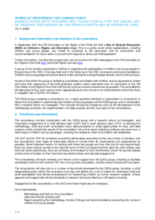Displaying 1181 - 1190 of 4424
In this webinar, hosted by ECDAN, presentations will focus on available data on young children from low and middle-income countries to enable stakeholders to improve early development, learning and pre-primary education through better understanding of determinants of and risks to children’s development, economic consequences and policy and legal frameworks to address them.
This webinar highlighted how children with developmental delays and disabilities can have the best chance to not only survive, but also thrive. The webinar delved into the challenges, emerging research from Kenya, and practical country examples from Mozambique, Tajikistan and Peru.
This global webinar will delve into the challenges, emerging research from Kenya, and practical country examples from Mozambique, Tajikistan and Peru. The webinar will highlight how children with developmental delays and disabilities can have the best chance to not only survive, but also thrive.
This Chapter elucidates the objectives, scope, and challenges in the implementation of the 1993 Intercountry Adoption Convention.
By drawing on the experiences of parents, advocates, NGOs, and public officials, this side event invited discussion on how, through strengthening families and tools for prevention, societies can reduce the number of children being institutionalized. During the event, a panel of experts from the Republic of Moldova, South Africa, Burkina Faso, Vietnam, and the United States explored their experiences around efforts to empower parents and keep children with disabilities with their families.
Disability Rights International, Validity Foundation, and the European Network for Independent Living, Youth Network Board hosted a webinar on children with disabilities in adversity as part of the Conference of States Parties to the UN Convention on the Rights of Persons with Disabilities.
By drawing on the experiences of parents, advocates, NGOs, and public officials, this side event will invite discussion on how through strengthening families and tools for prevention, societies can reduce the number of children being institutionalized.
Disability Rights International, Validity Foundation, and the European Network for Independent Living, Youth Network Board are hosting a webinar on children with disabilities in adversity as part of the Conference of States Parties to the UN Convention on the Rights of Persons with Disabilities.
A group of civil society organizations (CSOs) is supporting the participation of children and young people in the planning of the UN Committee on the Rights of the Child Day of General Discussion (DGD) on Children’s Rights and Alternative Care, including a worldwide consultation with children and young people to collect and voice their experience of the child protection system and/or alternative care. The CSOs group is seeking a consultancy (i.e. a highly qualified individual or organization or consortium) to deliver the consultation in partnership with children and young people and the CSOs group, and in coordination with a research ethics co-investigator.
This video is a recording of the virtual launch of the data collection protocol on children in residential care, held by UNICEF on 3 December 2020.

